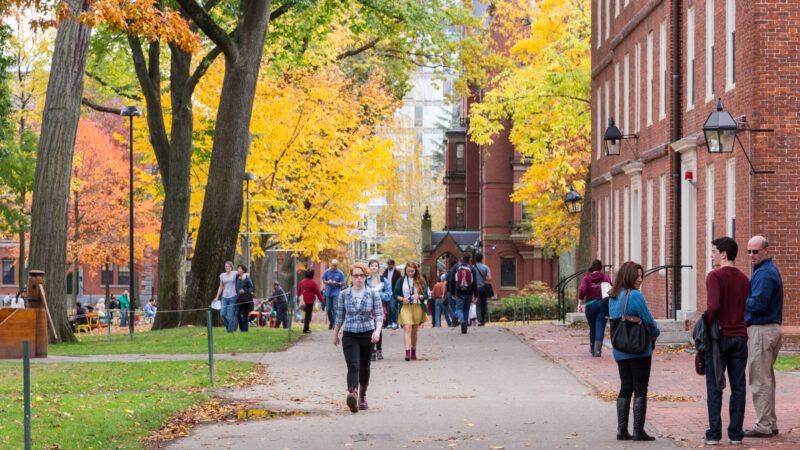Two-Thirds of College Students Think Shouting Down A Public Speaker Can Be Acceptable
Even at schools with solid speech policies, many students show little tolerance for opposing political beliefs.

According to a new survey, only one-third of college students say it's never acceptable to shout down a controversial campus speaker. And one-quarter think using violence can be acceptable in at least some circumstances to stop someone from speaking on campus.
This week, the Foundation for Individual Rights and Expression (FIRE), a First Amendment nonprofit released its fourth annual College Free Speech Rankings. The survey polled more than 55,000 students from nearly 250 colleges and universities.
The survey asked students about a wide range of speech-related issues, ranging from how students perceive their administration's support for free expression to whether speakers on controversial subjects, like abortion and transgender rights, should be allowed to speak on campus.
The survey found that more than half of students were worried about "damaging [their] reputation because someone misunderstands something [they] have said or done"; 16 percent were "very worried," 39 percent were "worried a little." Fifty-eight percent reported self-censoring "during conversations with other students on campus," with 33 percent self-censoring "once or twice a month," 18 percent self-censoring "a couple times a week," and 7 percent self-censoring "nearly every day."
When asking questions about controversial speakers, students seemed more willing to censor conservative speakers. For example, 71 percent of students agreed that a college "definitely" or "probably" should not allow a speaker on campus who previously expressed the idea that "Black Lives Matter is a hate group," while 28 percent answered the same about a speaker who had expressed the idea that "structural racism maintains inequality by protecting White privilege."
FIRE also ranked schools based on their campus free speech environment. Overall, Michigan Technological University took the top spot, followed by Auburn University and the University of New Hampshire. Harvard University ranked at the bottom of the pack, obtaining the lowest ranking in the survey's history—and gaining the first ever "abysmal" speech climate ranking from the group.
In addition to providing insights about the environment on many college campuses, the survey also illustrates how difficult it is to change student's attitudes toward free speech. Some of the highest-ranked campuses had middling or even well below-average scores on measures of student culture around speech issues. The highest-ranked schools consistently had "green" speech code ratings—a measure FIRE uses to indicate that a school's official policies do not trample student and faculty First Amendment rights—and administrations that consistently defended controversial speech.
However, many of these same schools seem to have student bodies that aren't quite so tolerant. For example, among the top 10 schools, seven ranked below average for "Openness"—a measure ranking students' self-reported ability to discuss controversial topics on campus—and none cracked the top 50. Half the top 10 schools were below average on "Comfort Expressing Ideas"—a category roughly approximating student-self censorship.
This fact shows how hard it can be for administrators to influence student behavior. While protecting student expression is essential for its own sake, such policies serve mainly to disincentivize students from engaging in some anti-speech activist activity—like speaker shutdowns or disininvitation campaigns—but it doesn't appear to make students more tolerant.
Colleges should protect student expression. Whether those same students end up appreciating this protection is another matter entirely.


Show Comments (143)